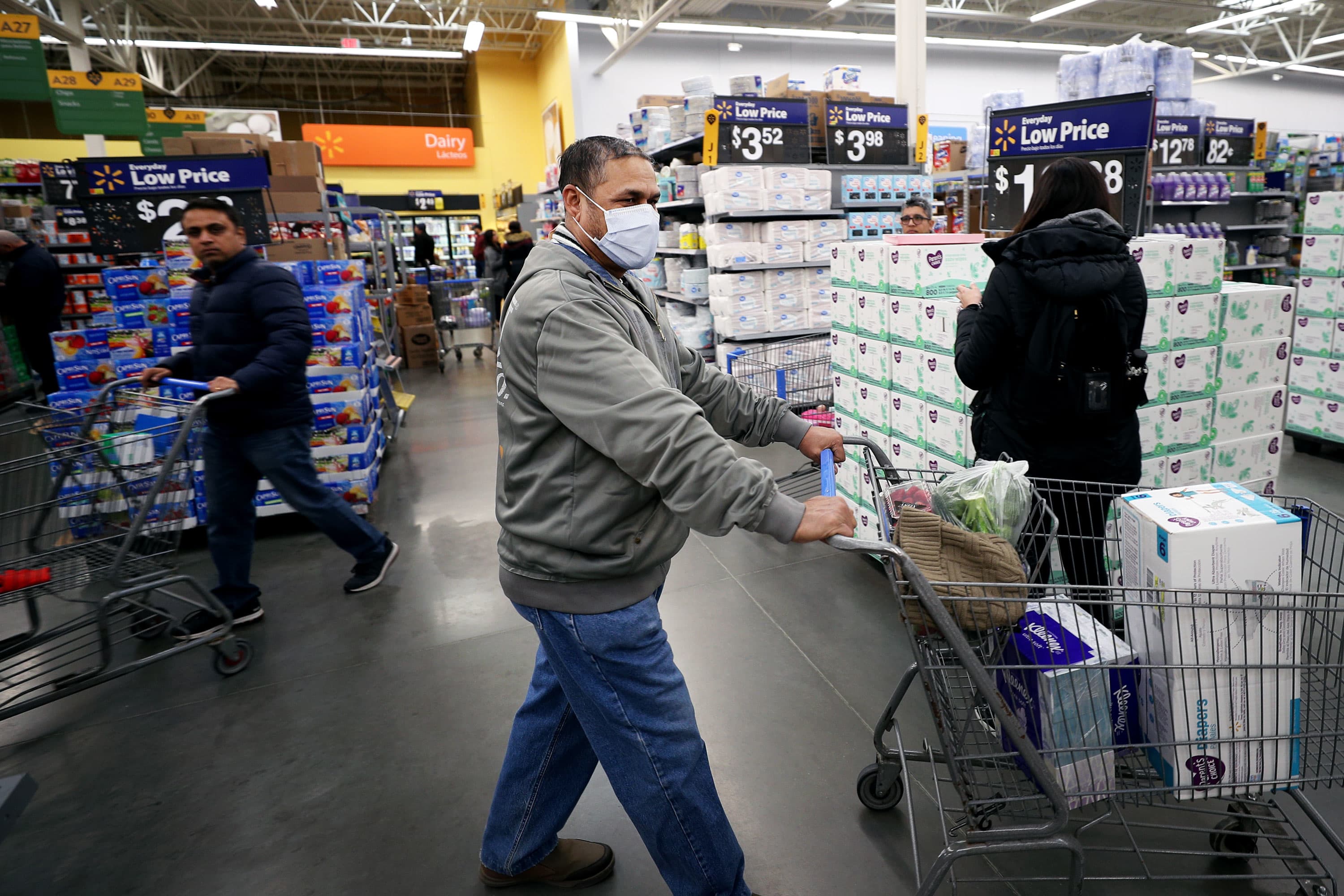This post was originally published on this site

A person wears a face mask as a precaution against coronavirus in New York, on March 2, 2020.
Tayfun Coskun | Anadolu Agency | Getty Images
Walmart shares are emerging as a winner during the chaotic coronavirus crisis.
The big box retailer, a classic defensive consumer staple stock, is benefiting from the millions of Americans stocking up on products for the unknown future. Plus, lower gas prices are relieving pressure from Walmart’s supply chain costs and potentially putting more money in the hands of the U.S. consumer if the coronavirus job losses can be contained.
“The unfortunate spread of the COVID-19 virus has created an unprecedented spike in demand for grocery and household products, as consumers prepare for weeks (maybe months) of school closures, work from home and restaurant closures,” Credit Suisse research analyst Seth Sigman said in a note to clients following his upgrade of the stock to outperform on Wednesday.
Stocks dropped violently in the past month on fears of the economic ramifications of the fast-spreading coronavirus. All three major averages are deep in bear market, more than 20% off their most recent high, which happened to be on Feb. 19. Since then, the S&P 500 has cratered 25%, while Walmart’s stock is in the green, gaining 2%.
Walmart, which has a market value of about $348 billion, is a beneficiary of consumers flooding its stores and stocking up on household items, like toiler paper, cleaning supplies and food. The government has encouraged “social distancing,” leaving millions of American quarantined in their homes for the foreseeable future. While most restaurants, hotels and movie theaters are shut down, Walmart is busier than ever, a trend Credit Suisse expected to persist for 12 months.
Walmart is “becoming more to the consumer, at the most important time,” said Sigman.
Demand is making it hard for Walmart to keep its shelves stocked. The retailer has adjusted its store hours and created shopping times for seniors only. Oppenheimer said this short-term shift in consumer spending could sustain Walmart’s same store sales growth through the market turmoil.
As the coronavirus continues to spread across the United States, stores like Walmart had problems keeping up with the high demand for paper goods leading to empty shelves on March 14, 2020 in Uniondale, New York.
Al Bello | Getty Images
“We believe the company is well positioned to still deliver on financial targets,” Oppenheimer analyst Rupesh Parikh told clients while upgrading the stock to buy.
It’s up for debate whether Walmart’s popularity and outperformance will continue after the pandemic crisis is a thing of the past.
“What happens when we get through this? Do we look at the companies that have the clean balance sheets that are the winners…I mean is Walmart going to be the nation’s retailer?,” asked CNBC’s Jim Cramer on “Squawk on the Street” on Thursday.
For Credit Suisse, Walmart isn’t just a short-term play here. The firm said it expects this unfortunate period to accelerate “structural changes in consumer shopping,” for five or more years, as people are introduced to new shopping methods like online grocery and curb-side pickup.
“This change should be sticky, and favor WMT, as it’s invested in its infrastructure, technology and people, to evolve its model,” Sigman added. “Bottom line, WMT is well positioned to serve the consumer through this difficult period as well as on the other side, as the customer acquisition benefits compound.”
Defensive in nature
Consumer staple giant Walmart is a classic defensive stock, meaning it is less tied to the economic cycle. The theory behind defensive stocks is even in times of economic uncertainty, people will still pay for their basic products, like toothpaste.
Shares of Walmart have historically outperformed during recessions in the U.S.
During the Global Financial Crisis Walmart shares rose 1%, compared to the 38% drop in the S&P 500 and during the 2001 recession shares of the retailer rose 10%, compared to the 8% fall of the S&P.
“Shares could benefit from money flows shorter-term as investors likely continue to seek safety in a more uncertain global economic backdrop,” said Parikh.
In addition to being defensive, Walmart is also a low volatility stock. The retailer has a beta of 0.69, meaning on a day the S&P 500 falls 1%, Walmart will only fall 0.69%.
Lower prices at the pump
Oil prices are tanking amid the market turmoil and a price war between Saudi Arabia and Russia. U.S. oil prices have lost nearly 60% since February, nearly $20 a barrel as the commodity gets hit on both the supply and demand side. Prices at the pump are about 26 cents lower than a month ago, according to AAA.
Lower gas prices help Walmart’s supply chain, as it costs less to get items to and from Walmart’s many stores. Lower prices at the pump also puts more money in the hands of consumers, who ultimately spend the extra cash on necessities like food and household items.
A headwind for Walmart could be the Americans that lose their jobs due to the industries shutting down from the virus. Massive unemployment would hit Walmart’s top line as consumers will spend less.
Subscribe to CNBC PRO for exclusive insights and analysis, and live business day programming from around the world.
— with reporting from CNBC’s Michael Bloom.





